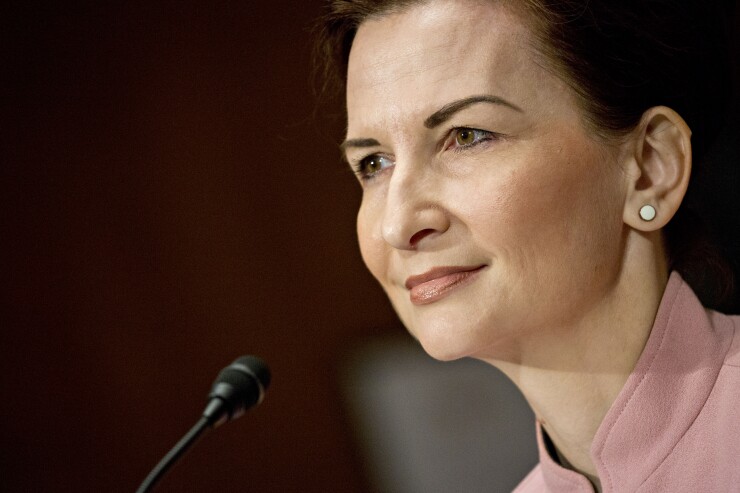WASHINGTON — Two weeks after
In her first public speech since being sworn in, McWilliams said FDIC staff is currently working on a massive list of all rulemakings, guidance and other policies that might be worth opening or reopening to the public for comment. This includes the Camels system for rating banks' health, which McWilliams said has not been open to public discussion since the mid-1990s.
She also discussed pushing FDIC staff to make faster decisions on deposit insurance applications, including for the controversial industrial loan company charter, and said she was open to discussions on how federal regulators approach marijuana banking issues in states with legal pot laws.

“I have asked staff already to take a look at the existing rules and to make me a list of all the guidelines that we have issued for comment and not for comment, as well as the rulemakings,” McWilliams said at a regulatory conference in Washington hosted by The Clearing House and the Securities Industry and Financial Markets Association. She said she will be particularly focused on existing guidance. "To the extent that guidances were never open for public comment, those will probably rise to the top of my list,” McWilliams said.
Meanwhile, a discussion about Camels ratings is also among her "top priorities," she said. In exams, banks receive total combined scores and individual scores in five areas: capital adequacy, assets, management capability, earnings, liquidity and sensitivity to market risk. The ratings are not disclosed to the public.
“I am going to take a look anew at the Camels rating. It guides so much what a bank can and cannot do,” McWilliams said. “I actually wonder whether the three agencies apply the Camels rating uniformly. And to the extent that they don’t, why not and what does it mean?”
McWilliams said she has directed the FDIC to move forward on making faster decisions on applications for deposit insurance. Her comments, which
The charter, which allows financial and nonfinancial companies to own a bank without following Bank Holding Company Act requirements, has long been a point of tension since Walmart unsuccessfully pursued an ILC in 2005. Entities have hesitated to file ILC applications for years, but with fintech firms eyeing ways to enter the banking system, the San Francisco-based Square filed an application late last year. Still, the FDIC has yet to rule on the charter bid.
“The agency has a duty to the public to actually proceed. Now, that doesn’t mean that we will approve every application. That doesn’t mean that we will deny every application,” McWilliams said. “But we have to move swiftly; we can’t just sit on those applications.”
McWilliams also said she’s working on a “tracker” to see how long it takes between an entity filing an application and the FDIC making a decision, and which steps were taken along the way.
“I’ll be rolling out some transparency initiatives at the FDIC where we actually are more open to you for feedback,” she said.
McWilliams said she was looking at how to balance regulating banks that do business with marijuana companies in states that have legalized pot as opposed to states where the substance is illegal.
Marijuana businesses in states where it is legal have been frustrated over the difficulty finding banks to cater to them, since some financial institutions are wary about running afoul of the federal marijuana ban.
“Unfortunately, our hands are somewhat tied and I have asked the staff to take us to the next level and think about what can we do here,” McWilliams said. “It’s not our job as an agency to set our federal policy” on marijuana banking, “but it is our job to help our regulated entities learn how to comply in a way that makes sense.”
One area McWilliams did not address is whether the FDIC would join the Office of the Comptroller of the Currency in soliciting public comment on how to reform and update the Community Reinvestment Act, a 1977 law that grades banks on their lending to communities where they operate.
Comptroller of the Currency Joseph Otting has for months spoken out in support of updating CRA procedures. While CRA policy is traditionally set in collaboration with the FDIC and Federal Reserve, Otting has sounded open to his agency moving ahead on its own, yet he has said he hoped the other bank regulators would join the effort.
Otting, who spoke at the same conference hours before McWilliams, said he left a recent meeting with FDIC officials with more confidence that they could reach an interagency agreement.
“Don’t I look taller,” Otting joked when asked how he felt after meeting with the FDIC. “I’m very encouraged ... if we can come together ... and produce this, I think then we collectively can do great things together.”
Speaking to reporters after his speech at the conference, Otting said he thinks McWilliams will "be a strong voice with a strong opinion."
“We have strong voices and strong opinions amongst the regulators and I think that’s a really valuable thing that we all come at the world slightly differently," he said.





